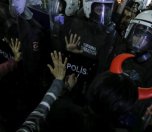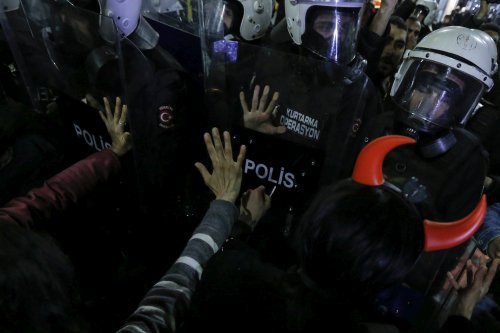* Photograph: Hüseyin Aldemir
Turkey's political landscape has recently been marked with incessant fluctuation between increasingly authoritarian measures and democratic proclamations – both on the part of the governing elite. The fluctuation is not new - it is symbolic of the governing style of the Justice and Development Party (Adalet ve Kalkınma Partisi, AKP) since it came to power in 2002.
However, the frequency and intensity of the fluctuations started to accelerate since 2013 Gezi Resistance. The background to the acceleration resides in the crisis-ridden unfolding of, what is widely known as, the "Democratic Opening" process that was given a rhetorical start in 2010, and terminated in 2014. The process was presented in terms of government's search for peaceful negotiations to settle the what has been defined as the "Kurdish issue". This meant the withdrawal from the tendency for pro-peace negotiations between the government and pro-Kurdish political circles.
The link between the Gezi Resistance and the termination of the "Democratic Opening" was certainly the surfacing of the AKP governments' authoritarian policy preferences. This link is revealed in the co-terminous securitization of rights-based claims and/or resistance to authoritarian practices of the government that were legitimized by the threat of terrorism.
The categories used to define what is happening at the governmental level in Turkey range from "competitive authoritarianism" (Esen and Gumuscu 2016) to "new authoritarianism" (Somer 2016) \ from Islamic "immoderation" (Kirdiş 2018) to "exceptionalism" (Bargu 2018). These readings share the impatience of describing the "here and now" of the governing experience of a political party, which has never completed its making (Coşar 2012). [1]
The analysis here does not subscribe to these categorizations as these readings by-pass the routinization of fascistic track. Besides, none of them takes into consideration the gender litmus test. Alternatively, this article starts with the assumption that the regime change in Turkey has unfolded through the fascistic track. And it relies on gender litmus test to substantiate this track, as well as to delineate the basics of the regime change.
Competitive authoritarianism pushes aside fascism and/or fascistic style of relating to politics by bringing in a novel version of authoritarian form of governing (Esen and Gumuscu, 2016). Explaining AKP's current rule with a view to "moderation" versus "immoderation" (Kirdiş 2018) shares with this formula the tendency to freeze one party's current performance to the very same moment of its existence. By approaching authoritarian practices merely as a matter of party deeds, party structure, party organization and/or lack of checks and balances, these readings fall into an institutionalist bias. Reading the state of affairs in Turkey with a view to exceptionalism runs the risk of undermining the historical background in forming structural connections, and analyzing the shifts and relocations in the new regime setting – for example, the re-balancing of the institutional power distribution between military and civilian branches of the state mechanism.
Under the AKP's rule, the infamous weight of TAF (Turkish Armed Forces) in civilian politics was gradually eliminated, and the military as an institution was put under the control of elected governments. The AKP's rule also witnessed the militarization of police forces, and subsequently civil societal actors – thus, a multi-dimensional process of militarization took hold while the TAF's weight in civilian politics was re-designed.
The above readings offer a frame that tends to by-pass the dialectics between such seemingly contradictory measures, and tempt one to explain the simultaneity as a matter of contradiction and/or inconsistency, thus feeding into an exceptionalist perspective. As such, they tend to treat the last phase of the AKP's rule as a discontinuity with the party's previous terms. They also risk reproducing the discourse of "exceptional times", manufactured under the AKP governments, and which runs through a rhetoric of fear and national liberation. [2]
The claim to exceptionality has always been an asset of nationalist and statist political preferences, mainly in foreign policy issues (See for example Demirtaş 2013; Yanık 2011).
In the recent regime change process, it seems that domestic policies have been turned into matters of survival through the exceptionalist discourse that situates the country and its leader into a war of all sorts against enemies ("Erdoğan: "Türkiye Yeni Bir Kurtuluş Savaşı Veriyor"" 2016):
"In the last 3 [sic.] years Turkey has been passing through virtually the ring of fire... We are fighting a new War of Liberation 90 years after our Republic was established... Besides, we are not fighting on just one front; our battle is on the military, political, diplomatic, economic and social fields." [3]
In this article, I approach the fluctuations – i.e., seemingly contradictory rhetoric and measures – as significant variables in the last stage of regime transformation in Turkey. [4] What marks this stage is the fascistic track that it has been since the Gezi Resistance in 2013. Here I rely on Geoff Eley's (2016) reading of contemporary fascism. By the term fascistic track, I refer to a type of relations to politics (104), defined not on a reading of the overlaps between Nazi and fascist regimes of the interwar period and World War II, and the rising tide of discriminatory, oppressive, rights-violating measures put into use by the governments that proclaim popular democratic credentials. Rather, I re-read the current rise of authoritarian politics with historical reference to the crisis of modernity in different periods.
The three consistent features of the current fascistic track are securitization of socio-political opposition, arbitrary targeting of the opponents as traitors, criminals and/or terrorists, and anti-intellectualism. All three of these features have their precedents in the first half of the twenty-first century: securitization operates through the claim to individual and national liberty; arbitrariness in the pattern of criminalization of the opponents runs through the monopolistic claims regarding the righteous way of opposition; and anti-intellectualism runs through the defamation of the critical academe and monopolistic claims on truth. In considering fascism as a type of relations to politics, I refer to the style of politics assumed by the representative figures of the political party in question, the construction of the leadership profile, the rhetoric that the leading cadres use in relating to the populace.
The manuscript is composed of three parts. In the first part, I offer a brief account of the AKP's terms in government with a view to the accompanying gender regime. In the second part, I delineate what I mean by regime change with a view to the re-organization of public order – a change in the rules and (political) resource allocations, and thus in the form of authority relations. The last stage of the regime change in Turkey hosted the dissolution of the secular Republican form of governing and the emergence of a religion-backed personalistic rule. My analysis of this stage is based on a feminist reading, connecting the regime transition to the change in the mode of patriarchy. In the third part, I offer a tentative discussion on the mode of patriarchy that accompanies the regime change in Turkey. By the mode of patriarchy, I refer to the gendered aspect of exploitative material relations of everyday life – i.e., the ordering of gender relations (German 1981; Eisenstein 1977). I focus on the gender regime as an integral part of the political regime, and not as an exclusive site for critical inquiry. The change in the mode of patriarchy is considered to be a factor that actively contributes to the course of regime change in Turkey. (SC/SD)
CLICK - Part 2: The AKP's Gender Regime: Anti Feminist Consistency
CLICK - Part 3: Regime Change and the New Mode of Patriarchy in Turkey
CLICK - Part 4: Naming the Feminist State
About Simten CoşarProf. Dr. Simten Coşar graduated from the Department of Political Science and International Relations of Boğaziçi University in İstanbul. She completed her Master's and PhD studies at the Department of Political Science and Public Administration of Bilkent University in Ankara. Her major subjects of academic interest are political thought, political thought in Turkey, political parties in Turkey and women in political thought. Her articles have been published on a series academic journals including the Journal of Political Ideologies, Contemporary Politics, Feminist Review, Journal of Third World Studies, South European Society and Politics ve Monthly Review. She has retired from the Department of Radio, Television and Cinema of Hacettepe University Faculty of Communication. |
Footnotes:
[1] Here I shall immediately distinguish Kirdiş's reading in that she offers a comprehensive critical analysis of the pitfalls of Islamist political identity for democratization at the party level. This analysis, however, shares with the other analyses the lack of gender litmus test and of considering the implications of the expansion of authoritarian policy preferences throughout the socio-political sphere.
[2] See Gross's (2006) analysis on the normalization of emergency through the routinization of otherwise exceptional powers in ruling.
[3] The theme of War of Liberation has been used in increasing frequency and latitude in Erdoğan's speeches delivered in a wide range of occasions. See for example, "Erdoğan: İkinci Bir Kurtuluş Savaşı Veriyoruz" 2018; "AK Parti Manisa İl Danışma Meclisi Toplantısı" 2017; "Erdoğan: Türkiye Yeni Bir Kurtuluş Savaşı Veriyor" 2016; "Erdoğan: Doğum Kontrolüyle Kısırlaştırdılar" 2013.
[4] By regime change, I mean change in the rules and basic political resource allocations according to which actors exercise authority by imposing or enforcing collective decisions on a bounded constituency – i.e., the re-building of public order.
[5] Here I deliberately use the word's masculine form – since the AKP's terms in government have been characterized by maleist rhetoric.
References:
Bargu, Banu. 2018. "Year One: Reflections on Turkey's Second Founding and the Politics of Division." Critical Times 1, no. 1: 23-48.
Coşar, Simten. 2012. "The AKP's Hold on Power: Neoliberalism Meets the Turkish-Islamic Synthesis." In Silent Violence: Neoliberalism, Islamist Politics and the AKP Years in Turkey, edited by Simten Coşar and Gamze Yücesan Özdemir, 67-92/ Canada: Red Quill Books.
Eisenstein, Zillah. 1977. "Constructing a Theory of Capitalist Patriarchy and Socialist Feminism.", Critical Sociology, 7 no.3: 3-17.
Eley, Geoff. 2016. "Fascism Then and Now." Socialist Register, 52: 91-117.
"Erdoğan: "Türkiye Yeni Bir Kurtuluş Savaşı Veriyor"" 2016.
https://www.yenicaggazetesi.com.tr/erdogan-turkiye-yeni-bir-kurtulus-savasiveriyor-151526h.htm November 26.
Esen, Berk and Gumuscu, Sebnem. 2016. "Rising Competitive Authoritarianism in Turkey." Third World Quarterly, 37 no.9: 1581-1606.
German, Lindsey. 1981. "Theories of Patriarchy International Socialism."
https://www.marxists.org/history/etol/writers/german/1981/xx/patriarchy.htm#f1 2 no. 12. (Accessed on October 12, 2018).
Kirdiş, Esen. 2018. "Wolves in Sheep Clothing or Victims of Times? Discussing the Immoderation of Incumbent Islamic Parties in Turkey, Egypt, Morocco, and Tunisia." Democratization 25, no.15: 901-918.
Somer, Murat. 2016. "Understanding Turkey's Democratic Breakdown: Old vs. New and Indigenous vs. Global Authoritarianism." Southeast European and Black Sea Studies, 16 no. 4: 481-503.











